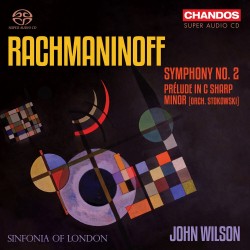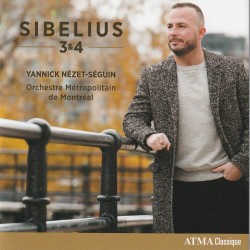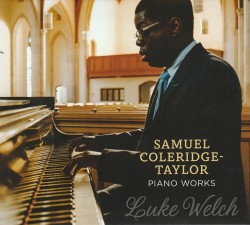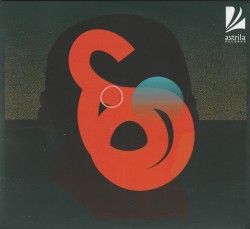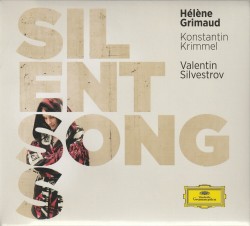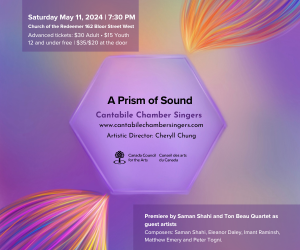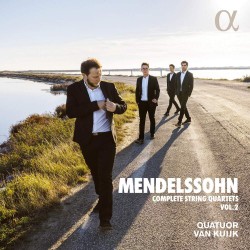 With Mendelssohn Complete String Quartets Vol.2 the Quatuor Van Kuijk complete the cycle of the composer’s string quartet output. Included here are the String Quartets No.4 in E Minor Op.44 No.2, No.5 in E-flat Major Op.44 No.3 and No.6 in F Minor Op.80 (Alpha Classics ALPHA931 outhere-music.com/en/albums/mendelssohn-complete-string-quartets-vol-2).
With Mendelssohn Complete String Quartets Vol.2 the Quatuor Van Kuijk complete the cycle of the composer’s string quartet output. Included here are the String Quartets No.4 in E Minor Op.44 No.2, No.5 in E-flat Major Op.44 No.3 and No.6 in F Minor Op.80 (Alpha Classics ALPHA931 outhere-music.com/en/albums/mendelssohn-complete-string-quartets-vol-2).
Both Op.44 quartets receive outstanding performances, but the real gem is Op.80, the last work Mendelssohn completed before his death and written in an outburst of grief following the death of his beloved sister Fanny. Described as “a confrontation with grief” it’s a striking work in which the composer’s pain is palpable, the performance here being one of quite stunning emotional impact and remarkable sensitivity and intensity.
The CD runs to a commendable 83 minutes, giving Quatuor Van Kuijk an edge over competing sets, many of which run to three volumes. Not that they need any advantage – it’s difficult to imagine any playing coming close to this.
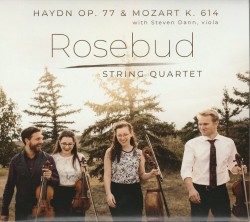 Three late works by the masters of Viennese classicism are presented on Haydn & Mozart, the new CD from Canada’s Rosebud Quartet and violist Steven Dann (Leaf Music LM252 leaf-music.ca).
Three late works by the masters of Viennese classicism are presented on Haydn & Mozart, the new CD from Canada’s Rosebud Quartet and violist Steven Dann (Leaf Music LM252 leaf-music.ca).
The CD has been getting frequent airplay on CBC Radio, and with good reason, all aspects of the release being of exceptional quality. The Haydn works are his two String Quartets in G Major Op.77 No.1 and F Major Op.77 No.2, apparently originally intended as part of a set of six. They are his last complete works in the medium, two later middle movements of an unfinished D minor quartet being published as Op.103.
Dann joins the quartet for Mozart’s String Quintet in E-flat Major K614, the last of his six and from April 1791, just eight months before his death.
Beautifully recorded at Quebec’s Domaine Forget, it’s an outstanding disc.
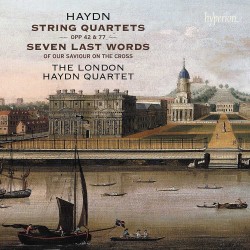 Fine performances of the two Haydn Op.77 quartets are also featured on Haydn String Quartets Opp.42, 77 & Seven Last Words, a two-for-the-price-of-one CD set with which The London Haydn Quartet complete their much-admired survey of the composer’s mature quartets using the original published editions (Hyperion CDA68410 hyperion-records.co.uk/dw.asp?dc=W13661_68410).
Fine performances of the two Haydn Op.77 quartets are also featured on Haydn String Quartets Opp.42, 77 & Seven Last Words, a two-for-the-price-of-one CD set with which The London Haydn Quartet complete their much-admired survey of the composer’s mature quartets using the original published editions (Hyperion CDA68410 hyperion-records.co.uk/dw.asp?dc=W13661_68410).
The String Quartet in D Minor Op.42 completes the first disc, with the second CD filled by the lengthy – over 75 minutes – Seven Last Words of our Saviour on the Cross Op.51, Haydn’s own arrangement of his orchestral original. Described as a fitting testimonial to the composer’s deep, enduring faith it compensates for the inevitable loss of orchestral colour and power by an increased sense of intimacy. Given the subject matter it’s not always an easy listen, but its emotional impact is considerable.
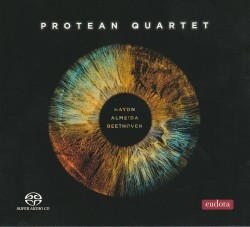 In the booklet notes for the new CD Haydn Almeida Beethoven on the Spanish Eudora label the Protean Quartet members say that since 2018 they have focused their activity on historical performance on period instruments, and that one of their major creative engines is the recovery of Spanish music heritage and its dissemination. Their contribution here is the first recording of the String Quartet in G Minor Op.7 No.1 by the Portuguese-born Juan Pedro Almeida Mota (1744-c.1817), who developed his career in Spain (EUD-SACD-2301 eudorarecords.com).
In the booklet notes for the new CD Haydn Almeida Beethoven on the Spanish Eudora label the Protean Quartet members say that since 2018 they have focused their activity on historical performance on period instruments, and that one of their major creative engines is the recovery of Spanish music heritage and its dissemination. Their contribution here is the first recording of the String Quartet in G Minor Op.7 No.1 by the Portuguese-born Juan Pedro Almeida Mota (1744-c.1817), who developed his career in Spain (EUD-SACD-2301 eudorarecords.com).
Haydn’s String Quartet in D Major Op.33 No.6 is a lovely opening to the disc, the freshness and elegance of the work conveyed perfectly through light and sensitive playing. The same performing qualities are evident in the Mota quartet – again, a light but attractive and not insubstantial work.
The beautifully clean and articulated performance of Beethoven’s String Quartet in F Major Op.18 No.1 gives the whole CD a decided consistency, with a delightfully playful touch mixed with sensitivity and insight.
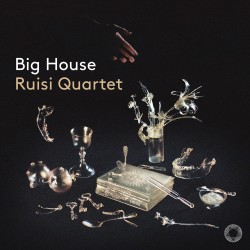 The Ruisi Quartet make their Pentatone label debut with Big House, featuring music by Joseph Haydn, Matthew Locke and the young British composer Oliver Leith (Pentatone PTC 5187040 pentatonemusic.com/product/big-house).
The Ruisi Quartet make their Pentatone label debut with Big House, featuring music by Joseph Haydn, Matthew Locke and the young British composer Oliver Leith (Pentatone PTC 5187040 pentatonemusic.com/product/big-house).
Finely judged performances of two Haydn works – the String Quartet No.11 in D Minor Op.9 No.4 and the String Quartet No.23 in F Minor Op.20 No.5 – open and close the disc. The brief Fantasie from Locke’s Consort of 4 Parts: Suite No.3 in F is paired with Leith’s equally brief 2020 reworking of A different Fantasie from Suite No.5 in G Minor (After Locke’s Consort of 4 Parts).
The central and largest work is Leith’s seven-movement string quartet The Big House, inspired by the 1980 book In Ruins: The Once Great Houses of Ireland by photographer Sir Simon Marsden, who specialized in black-and-white photographs of allegedly haunted houses. There’s certainly an eerie air of decay in the slow, distinctive and unusual but effective writing, albeit with very little variation.
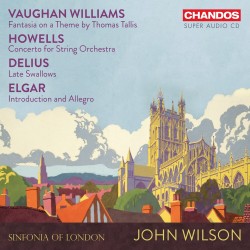 John Wilson leads the Sinfonia of London in simply outstanding performances of English string music on Vaughan Williams, Howells, Delius, Elgar: Music for Strings (Chandos CHSA 3291 chandos.net/products/catalogue/CHAN%205291).
John Wilson leads the Sinfonia of London in simply outstanding performances of English string music on Vaughan Williams, Howells, Delius, Elgar: Music for Strings (Chandos CHSA 3291 chandos.net/products/catalogue/CHAN%205291).
Vaughan Williams’ Fantasia on a Theme by Thomas Tallis for Double String Orchestra was written for the 1910 Three Choirs Festival at Gloucester Cathedral and designed to exploit the cathedral’s acoustics. The antiphonal forces – the smaller second orchestra and a featured string quartet – are captured here in stunning detail.
Herbert Howells was an organ student at Gloucester and present at the Fantasia premiere. A few weeks later he heard Elgar’s Introduction and Allegro for Strings (Quartet and Orchestra) Op.47, calling the events “two intensely timely, kindling, formative experiences.” His own Concerto for String Orchestra from 1938 was begun in 1934 as a tribute to Elgar, who had died that year, but the middle movement became an In Memoriam tribute to both Elgar and Howells’ own nine-year-old son, who died suddenly in 1935. Using the same forces as the Elgar, it’s an impressive and impassioned work that should really be much better known.
The Delius work is Late Swallows, the slow movement of his 1916-1917 String Quartet arranged by Eric Fenby in 1962-63. A rich and glorious reading of the Elgar work concludes a superb disc.
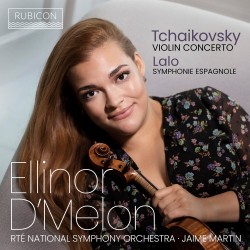 Violinist Ellinor D’Melon is outstanding on her debut album on the Rubicon Classics label, pairing the Tchaikovsky Violin Concerto in D Major Op.35 with Lalo’s Symphonie espagnole in D Minor Op.21, ably supported by the RTÉ National Symphony Orchestra under Jaime Martin (RCD 1106 rubiconclassics.com/release/rteso-ellinor-dmelon-tchaikovsky-lalo).
Violinist Ellinor D’Melon is outstanding on her debut album on the Rubicon Classics label, pairing the Tchaikovsky Violin Concerto in D Major Op.35 with Lalo’s Symphonie espagnole in D Minor Op.21, ably supported by the RTÉ National Symphony Orchestra under Jaime Martin (RCD 1106 rubiconclassics.com/release/rteso-ellinor-dmelon-tchaikovsky-lalo).
From the lush, glowing tones of the opening of the Tchaikovsky it’s obvious that this is a player with complete technical command and a fine sense of phrasing and shaping, and nothing in the rest of the concerto or in the Lalo does anything to challenge that assumption. There is a link between the two works – Tchaikovsky’s playing through the Lalo with violinist Iosif Kotek in early 1878 led directly to Tchaikovsky composing his own concerto.
The spacious recorded sound perfectly showcases the tonal quality of the two Guarneri “Del Gesù” violins D’Melon plays here: the c.1744 “Sainton” in the Tchaikovsky and the c.1724 “Caspar Hauser” in the Lalo.
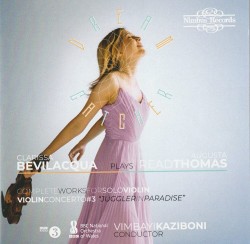 Dream Catcher, the latest release in the ongoing survey of the works of American composer Augusta Read Thomas is the debut album by the young violinist Clarissa Bevilacqua, who was instrumental in devising the program after getting to know Read Thomas and performing her violin compositions. The complete works for solo violin are here, along with the 2008 Violin Concerto No.3 “Juggler in Paradise” with the BBC National Orchestra of Wales conducted by Vimbayi Kaziboni (Nimbus Records NI8109 wyastone.co.uk).
Dream Catcher, the latest release in the ongoing survey of the works of American composer Augusta Read Thomas is the debut album by the young violinist Clarissa Bevilacqua, who was instrumental in devising the program after getting to know Read Thomas and performing her violin compositions. The complete works for solo violin are here, along with the 2008 Violin Concerto No.3 “Juggler in Paradise” with the BBC National Orchestra of Wales conducted by Vimbayi Kaziboni (Nimbus Records NI8109 wyastone.co.uk).
The nine solo works to date range from 1995’s Incantation to three works from 2016. The CD’s title track from 2008 is intimately linked with the concerto, being essentially the opening and closing violin sections without the orchestra.
Bevilacqua says that this album is the first of “hopefully many projects” championing works that reflect our present instead of our past. Certainly her technical prowess and interpretative skills promise great things ahead.
 The Norwegian violinist Eldbjørg Hemsing makes her Sony Classical label debut with Arctic – A Musical Journey with the Arctic Philharmonic Orchestra (19439936082 eldbjorgmusic.com/album/arctic).
The Norwegian violinist Eldbjørg Hemsing makes her Sony Classical label debut with Arctic – A Musical Journey with the Arctic Philharmonic Orchestra (19439936082 eldbjorgmusic.com/album/arctic).
Celebrating the matchless beauty of the largely unexplored regions of Norway and acknowledging the threat posed by climate change, the CD is full of exhilarating melodies and impressively scored soundscapes, combining elements from American film music and European neo-classical music.
The former is certainly covered by the one substantial work on the disc, the lush, cinematic six-part Arctic Suite by Los Angeles-based film composer Jacob Shea. The remaining nine tracks, mostly in arrangements by Ben Palmer, are short pieces by Henning Sommero, Frode Fjellheim, Ola Gjeillo, Einojuhani Rautavaara, Selim Palmgren, Ole Bull and James Newton Howard, with Grieg’s The Last Spring closing the disc.
It’s all beautifully played and recorded, with Hemsing in superb form.
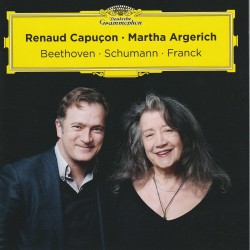 Put two superb musicians together and three standard repertoire sonatas suddenly become anything but routine. So it is on Beethoven, Schumann, Franck: Violin Sonatas, where violinist Renaud Capuçon joins pianist Martha Argerich in thrilling performances of Schumann’s Sonata No.1 in A Minor Op.105, Beethoven’s Sonata No.9 in A Major Op.47 “Kreutzer” and the Franck Sonata in A Major (Deutsche Grammophon 486 3533 deutschegrammophon.com/en/catalogue/products/beethoven-schumann-franck-renaud-capucon-martha-argerich-12809).
Put two superb musicians together and three standard repertoire sonatas suddenly become anything but routine. So it is on Beethoven, Schumann, Franck: Violin Sonatas, where violinist Renaud Capuçon joins pianist Martha Argerich in thrilling performances of Schumann’s Sonata No.1 in A Minor Op.105, Beethoven’s Sonata No.9 in A Major Op.47 “Kreutzer” and the Franck Sonata in A Major (Deutsche Grammophon 486 3533 deutschegrammophon.com/en/catalogue/products/beethoven-schumann-franck-renaud-capucon-martha-argerich-12809).
The two have performed together for many years, with Capuçon saying that Argerich makes him play “like nobody else makes me play.” Certainly this recital, recorded live in concert at the Aix-en-Provence Easter Festival in April 2022, more than bears that out, with a remarkable final movement of the Franck in particular bringing a stellar recital to an electrifying close.
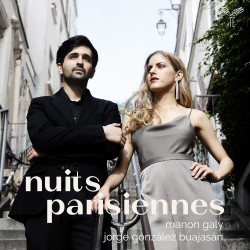 Violinist Manon Galy and pianist Jorge González Buajasán perform an engrossing recital of French music on nuits parisienne, with works by Debussy, Ravel, Poulenc and Milhaud (Aparté AP306 apartemusic.com).
Violinist Manon Galy and pianist Jorge González Buajasán perform an engrossing recital of French music on nuits parisienne, with works by Debussy, Ravel, Poulenc and Milhaud (Aparté AP306 apartemusic.com).
Debussy’s Beau soir and 1917 Violin Sonata open the disc, followed by Ravel’s Pavane pour une infante défunte and the lush and expansive early Violin Sonata M.12 from 1897, not published until 1975.
It’s Poulenc and Milhaud who steal the show however, with the former’s 1934 Presto and a welcome reappearance of his fascinating 1942 Violin Sonata setting the stage for Milhaud’s 1937 Brazileira (Scaramouche) and the tour-de-force Cinéma-fantasie (after Le boeuf sur le toit) Op.58b from 1919, a dazzling work that uses fragments of Brazilian songs in a rondo-like structure and includes a huge solo violin cadenza in the middle, apparently contributed by Arthur Honegger. It draws simply fabulous playing from both performers.
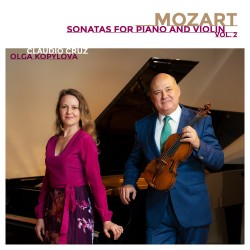 On the digital-only release Mozart Sonatas for Piano and Violin Vol.2 violinist Claudio Cruz and pianist Olga Kopylova perform six of the mature sonatas Mozart wrote between 1778 and 1781 (Azul Music AMDA1813 azulmusic.com.br).
On the digital-only release Mozart Sonatas for Piano and Violin Vol.2 violinist Claudio Cruz and pianist Olga Kopylova perform six of the mature sonatas Mozart wrote between 1778 and 1781 (Azul Music AMDA1813 azulmusic.com.br).
The title reflects the developmental stage of the sonata at the time, with the violin not yet the main protagonist. The piano is certainly much to the fore here, with a warm tone and minimal resonance, but the balance never suffers; more importantly, there is beautifully judged playing from both performers, with crystal-clear, sensitive and unaffected performances of the Sonatas No.17 in C Major K296, No.24 in F Major K376, No.25 in F Major K377, No.26 in B-flat Major K378, No.27 in G Major K379 and No.28 in E-flat Major K380.
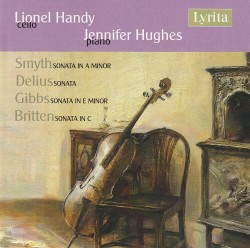 Cellist Lionel Handy and pianist Jennifer Walsh are building an impressive discography of British works for cello and piano, their previous CDs of British Cello Music and works by Ireland, Delius and Bax being followed by their latest CD British Cello Works Volume 2 (Lyrita SRCD.412 wyastone.co.uk).
Cellist Lionel Handy and pianist Jennifer Walsh are building an impressive discography of British works for cello and piano, their previous CDs of British Cello Music and works by Ireland, Delius and Bax being followed by their latest CD British Cello Works Volume 2 (Lyrita SRCD.412 wyastone.co.uk).
The works here range from Ethel Smyth’s 1887 Sonata in A Minor Op.5, written in her post-Leipzig study period but not premiered until 1926 in London, to Britten’s Sonata in C Major Op.65 from 1960-61, its five individually-titled movements – Dialogo, Scherzo-Pizzicato, Elegia, Marcia and Moto Perpetuo – giving the work the feel of a suite of characteristic studies.
In between are Delius’ 1916 three-part single-movement Sonata and the Armstrong Gibbs Sonata in E Minor Op.132 from 1951, a lovely work that draws particularly attractive playing.
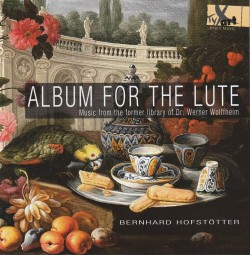 On Album for the Lute – Music from the former library of Dr. Werner Wolffheim the lutenist Bernhard Hofstötter has selected a number of characteristic pieces – all but one first recordings – from the handwritten and bound manuscript collection sold at auction in Berlin in 1929, the original context and ownership of which remains unknown (TYXart TXA22172 tyxart.de/en/txa22172_album-for-the-lute.html).
On Album for the Lute – Music from the former library of Dr. Werner Wolffheim the lutenist Bernhard Hofstötter has selected a number of characteristic pieces – all but one first recordings – from the handwritten and bound manuscript collection sold at auction in Berlin in 1929, the original context and ownership of which remains unknown (TYXart TXA22172 tyxart.de/en/txa22172_album-for-the-lute.html).
All pieces in the collection are in D major (the “Käyserliche Stimmung” or imperial tuning) as opposed to the characteristic D minor tuning of the Baroque lute. Hofstötter has created three groups of selections – or “partitas” – and separated them with chaconnes in different keys and from other manuscripts. Most of the pieces are anonymous, but composers represented are Achaz Casimir Hültz, Esaias Reusner the Younger, Germain Pinel, Ennemond Gaultier, Johann Heinrich Schmelzer and the wonderfully named but otherwise untraceable Jean Berdolde Bernard Bleystein de Prague.
Hofstötter’s warm, rich tone and superb technique, together with the clean and beautifully resonant recording, make the 73 minutes of a fascinating recital simply fly by.
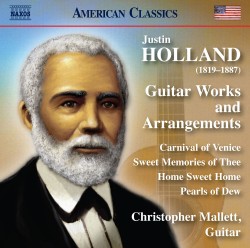 The free-born African American, Justin Holland (1819-1887), was not only an important figure in the anti-slavery and civil rights movements but also the most influential and significant American guitarist of the 19th century, writing the country’s first published guitar method and publishing some 35 original works and 300 arrangements and variations on popular European and American themes. On Justin Holland Guitar Works and Arrangements the American guitarist Christopher Mallett gives us a fascinating look at a seldom-heard musician (Naxos Classics 8.559924 naxos.com/CatalogueDetail/?id=8.559924).
The free-born African American, Justin Holland (1819-1887), was not only an important figure in the anti-slavery and civil rights movements but also the most influential and significant American guitarist of the 19th century, writing the country’s first published guitar method and publishing some 35 original works and 300 arrangements and variations on popular European and American themes. On Justin Holland Guitar Works and Arrangements the American guitarist Christopher Mallett gives us a fascinating look at a seldom-heard musician (Naxos Classics 8.559924 naxos.com/CatalogueDetail/?id=8.559924).
Only two of the 14 tracks – An Andante in C Major and Variations on L. Mason’s “Nearer My God, to Thee” – are Holland originals, with arrangements varying from standards like ‘Tis the Last Rose of Summer and Henry Bishop’s Home Sweet Home, to traditional pieces and works by little-known names like Alfred Humphreys Pease, Ferdinand Beyer, W. H. Rulison, Alphons Czibulka, Tekla Badarzewska-Baranowska and Alphonse Leduc. Seven tracks are world-premiere recordings.
Mallett’s idiomatic playing makes for an immensely enjoyable disc.
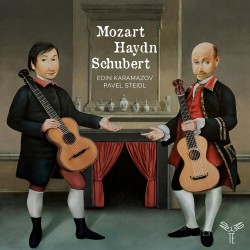 Vienna was the centre of European musical life in the late-18th and early-19th centuries, and while there were hardly any original works for the rapidly emerging classical guitar there were many arrangements and transcriptions for the instrument. New arrangements of three emblematic works of the period are presented on Mozart Haydn Schubert, with the Bosnian lutenist Edin Karamazov and the Czech guitarist Pavel Steidl playing Karamazov’s transcriptions for two guitars of two keyboard works – Haydn’s Sonata in E-flat Major Hob.XVI:49 from around 1790 and Mozart’s Fantasia in C Minor K475 from 1785 – and Schubert’s Arpeggione Sonata D821 from 1824 (Aparté AP309 apartemusic.com).
Vienna was the centre of European musical life in the late-18th and early-19th centuries, and while there were hardly any original works for the rapidly emerging classical guitar there were many arrangements and transcriptions for the instrument. New arrangements of three emblematic works of the period are presented on Mozart Haydn Schubert, with the Bosnian lutenist Edin Karamazov and the Czech guitarist Pavel Steidl playing Karamazov’s transcriptions for two guitars of two keyboard works – Haydn’s Sonata in E-flat Major Hob.XVI:49 from around 1790 and Mozart’s Fantasia in C Minor K475 from 1785 – and Schubert’s Arpeggione Sonata D821 from 1824 (Aparté AP309 apartemusic.com).
Both players use modern copies of contemporary instruments, Steidl, a Bernd Kresse guitar after Johann Anton Stauffer and Karamazov, a Gabriele Lodi guitar after René Lacôte. The soft, warm sounds create beautiful and interesting tone colours, and the very effective transcriptions make for a delightful CD.
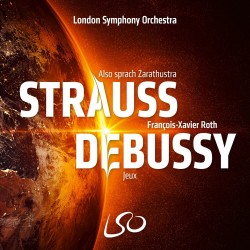 Strauss – Also Sprach Zarathustra | Debussy – Jeux
Strauss – Also Sprach Zarathustra | Debussy – Jeux

